
Thomas Beard (died 1632) was an English clergyman and theologian, of Puritan views. He is known as the author of The Theatre of Gods Judgements, and the schoolmaster of Oliver Cromwell at Huntingdon.

Thomas Beard (died 1632) was an English clergyman and theologian, of Puritan views. He is known as the author of The Theatre of Gods Judgements, and the schoolmaster of Oliver Cromwell at Huntingdon.
He was, it is believed, a native of Huntingdon, but the date of his birth is unknown. He received his education at Jesus College, Cambridge, [1] where he was a sizar and matriculated in 1584. He graduated B.A. in 1588, M.A. in 1591, B.D. in 1602 and D.D. in 1614. [2] He became rector of Kimbolton in 1595. On 21 January 1598 he was collated to the rectory of Hengrave, Suffolk, which he held for a very short time, moving as rector to Aythorpe Roding, Essex, later in the year. In 1605, Beard became master of Huntingdon hospital and grammar school, where he remained for twenty years. [2] It was at this school that Cromwell was educated from around 1604, and was prepared for entrance to Cambridge; he acted in Beard's school plays, and Beard became a friend of the Cromwell family. [3] In March 1614, Beard asked Sir Robert Bruce Cotton for the rectory of Conington, being tired of teaching. He held various rectories with his teaching job, in the end at Wistow where he settled in 1618 for the rest of his life. In 1626, Beard also held a popular lectureship at Huntingdon.
In 1628, when Richard Neile went before the House of Commons of England accused of anti-puritan practices, Beard was summoned as a witness against him. Cromwell's speech in the debate on the subject covers his likely testimony (the parliament was dissolved before Beard could testify). Beard had been appointed in 1617 to preach a sermon on the Sunday after Easter in London, in which, according to custom, he was to recapitulate three sermons previously preached before the lord mayor from an open pulpit in Spital Square. William Alabaster was the preacher whom Beard had to follow, but he announced his intention of exposing Alabaster's support of certain tenets of popery. On Cromwell's account, Neile as Beard's diocesan bishop (diocese of Lincoln) told him not to preach against Alabaster; and reprimanded him later when on the advice of Nicholas Felton he did so.
In 1630 he was made a justice of the peace for the county. He was married, and had children by Mary Heriman; they were married 9 July 1628. Edward Wedlake Brayley in his Beauties of England and Wales recorded the inscription on a brass in the nave of All Saints' Church, Huntingdon, to Beard's memory. In 1633 Archbishop William Laud succeeded in putting the lectureship down.
The Theatre of Gods Judgements, Beard's earliest and most famous book, first appeared in 1597; [4] a work in the tradition of John Foxe's Acts and Monuments , it was popular, plagiarised and pirated. [5] It was itself translated, in part, from the Histoires memorables des grans et merveilleux jugemens et punitions de Dieu by Jean de Chassanion (1531–1598), a Huguenot pastor from Monistrol-sur-Loire, [6] from which it derives its account of the bullet catch trick. [7] [8]
Chassingnon's book provided hundreds of the examples, while Beard added in a scattering from other sources closer to home: Foxe, John Stowe, Raphael Holinshed, pamphlets and ballads. [9] Beard's exposition of the workings of Providence against sinners and persecutors has been called "theatrical moralism". [10] It was in the Theatre of Judgement that first appeared an account of Christopher Marlowe's death by stabbing; Beard takes Marlowe to be the first modern atheist. [11] Other editions followed in 1612 and 1631, with additions, and a fourth edition in folio of 1648.
In 1625 he published a work on the Pope as Antichrist. [12] Beard left in manuscript an Evangelical Tragoedie: or, A Harmonie of the Passion of Christ, according to the four Evangelistes. A Latin comedy Pedantius [13] has been attributed to him, but also to Walter Hawkesworth, Anthony Wingfield and (by modern scholars) to Edward Forsett. [14]

Edmund Calamy was an English Presbyterian church leader and divine. Known as "the elder", he was the first of four generations of nonconformist ministers bearing the same name.

Richard Neile was an English churchman, bishop successively of six English dioceses, more than any other man, including the Archdiocese of York from 1631 until his death. He was involved in the last burning at the stake for heresy in England, that of the Arian Edward Wightman in 1612.

Samuel Harsnett, born Samuel Halsnoth, was an English writer on religion and Archbishop of York from 1629.
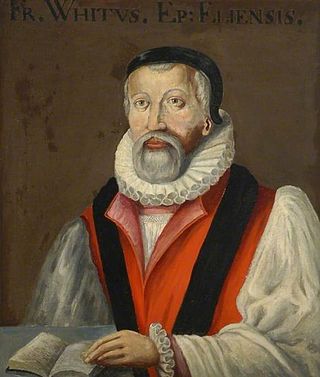
Francis White was an English bishop and controversialist.

Robert Abbot was an Anglican bishop, academic and polemical writer. He served as Master of Balliol College, Oxford, Regius Professor of Divinity, and Bishop of Salisbury from 1615. Among his four younger brothers, George became Archbishop of Canterbury and Maurice became Lord Mayor of London.

Henry Burton (1578–1648), was an English puritan. Along with John Bastwick and William Prynne, Burton's ears were cut off in 1637 for writing pamphlets attacking the views of Archbishop Laud.
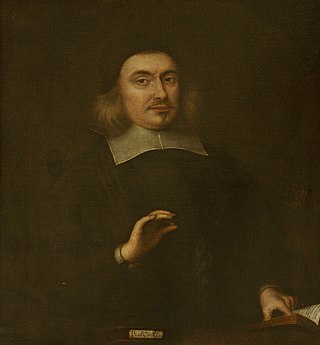
Rev. John Conant D.D. was an English clergyman and theologian. He was Vice-Chancellor of Oxford University, and later archdeacon of Norwich.
Events from the 1560s in England.
Events from the 1590s in England.
Griffith Williams (c.1589–1672) was the Anglican bishop of Ossory. He was opposed to the Puritans.

Benjamin Lany was an English academic and bishop.
Jeremiah Whitaker (1599–1654) was an English Puritan clergyman, and important member of the Westminster Assembly.
Robert Harris (1581–1658) was an English clergyman, known as a Puritan preacher, member of the Westminster Assembly, and President of Trinity College, Oxford.
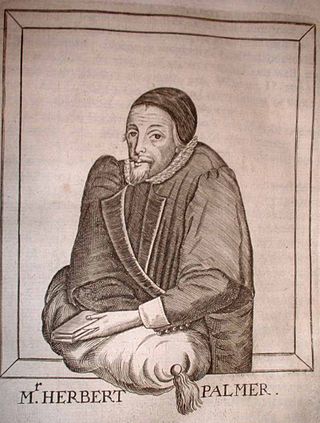
Herbert Palmer (1601–1647) was an English Puritan clergyman, member of the Westminster Assembly, and President of Queens' College, Cambridge. He is now remembered for his work on the Westminster Shorter Catechism, and as a leading opponent of John Milton's divorce tracts.
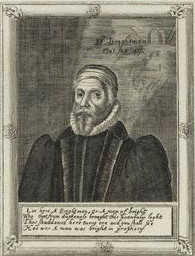
Thomas Brightman (1562–1607) was an English clergyman and biblical commentator. His exegesis of the Book of Revelation, published posthumously, proved influential. According to William M. Lamont, Brightman and Joseph Mede were the two most important revisionists of the interpretation and eschatology set down by John Foxe; among Brightman's contributions was to weaken the imperial associations tied to the Emperor Constantine I. The detailed reading, in favour of the Genevan and Scottish churches, and condemning the 'Laodicean' (lukewarm) Church of England, helped to move on the Puritan conceptions of church reform and its urgency.
Augustine Lindsell was an English classical scholar and Bishop of Hereford. In church matters he was advanced by Richard Neile, and was a firm supporter of William Laud. As a scholar he influenced Thomas Farnaby.
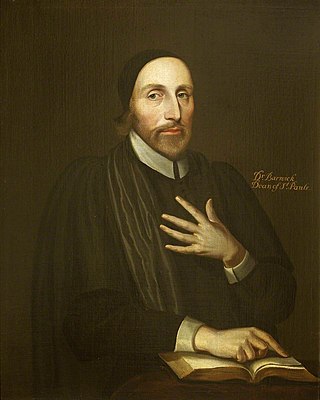
John Barwick (1612–1664) was an early English royalist churchman and Dean of St. Paul's Cathedral.
John Shawe or Shaw (1608–1672) was an English Puritan minister, an influential preacher in the north of England during the Interregnum.

The reign of Elizabeth I of England, from 1558 to 1603, saw the start of the Puritan movement in England, its clash with the authorities of the Church of England, and its temporarily effective suppression as a political movement in the 1590s by judicial means. This led to the further alienation of Anglicans and Puritans from one another in the 17th century during the reign of King James (1603–1625) and the reign of King Charles I (1625–1649), that eventually brought about the English Civil War (1642–1651), the brief rule of the Puritan Lord Protector of England Oliver Cromwell (1653–1658), the English Commonwealth (1649–1660), and as a result the political, religious, and civil liberty that is celebrated today in all English speaking countries.
John Frewen (1558–1628) was an English Puritan divine.